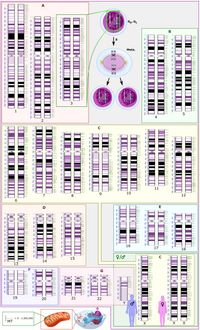
Photo from wikipedia
The analysis of whole-genome sequencing studies is challenging due to the large number of noncoding rare variants, our limited understanding of their functional effects, and the lack of natural units… Click to show full abstract
The analysis of whole-genome sequencing studies is challenging due to the large number of noncoding rare variants, our limited understanding of their functional effects, and the lack of natural units for testing. Here we propose a scan statistic framework, WGScan, to simultaneously detect the existence, and estimate the locations of association signals at genome-wide scale. WGScan can analytically estimate the significance threshold for a whole-genome scan; utilize summary statistics for a meta-analysis; incorporate functional annotations for enhanced discoveries in noncoding regions; and enable enrichment analyses using genome-wide summary statistics. Based on the analysis of whole genomes of 1,786 phenotypically discordant sibling pairs from the Simons Simplex Collection study for autism spectrum disorders, we derive genome-wide significance thresholds for whole genome sequencing studies and detect significant enrichments of regions showing associations with autism in promoter regions, functional categories related to autism, and enhancers predicted to regulate expression of autism associated genes.Whole-genome sequencing data reveals a large number of variants for testing their associations with phenotypic traits and diseases. Here, the authors develop WGScan, a statistical method for detecting the existence and estimating the locations of the association signal at genome-wide scale.
Journal Title: Nature Communications
Year Published: 2019
Link to full text (if available)
Share on Social Media: Sign Up to like & get
recommendations!